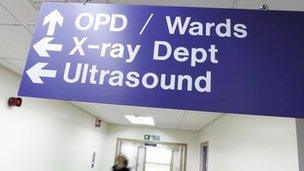'24-hour' complaint process needed
- Published

Patients need 'better direction' about how to make complaints and concerns
Patients, carers and relatives should be able to raise concerns over NHS care 24 hours a day, suggests Health Ombudsman Julie Mellor.
In this week's Scrubbing Up - she explains how she hopes the Clwyd-Hart Review of hospital complaints will help tackle the "toxic cocktail" of reluctance by patients to complain and defensiveness of NHS organisations when addressing complaints and concerns.
Too often we hear of patients not having the confidence to raise a concern on a hospital ward.
They fear they won't be listened to or taken seriously.
Even if they do complain, they can find NHS organisations defensive rather than open to feedback.
One of the many people who we've spoken to about complaining said: "I feel like the little man against the system".
We know this is an issue from the ward to the hospital board.
'Change approach'
The Ombudsman report 'NHS governance of complaints handling' found that only a fifth of NHS boards review learning from complaints and subsequently take action to improve services.
People come to us once they've exhausted the local NHS complaints process.
Our new approach from April this year means we have already accepted three times more complaints for investigation than we did last year and are sharing more learning from them with the NHS.
We want hospitals to change their approach too and to welcome complaints and concerns raised by patients and carers at a local level as opportunities for improvement.
We think it is critical that the "toxic cocktail" of reluctance to complain by patients coupled with defensiveness by NHS staff and organisations is tackled as a priority.
We need to see a shift to a more open, collaborative and transparent culture within the NHS.
This emphasis on local resolution can lead to opportunities to learn and improve services, providing a change in complaints handling from ward to board level.
In order to deliver this change, there needs to be a focus on what patients need to help them raise a concern.
'Identifiable brand'
The research and evidence we submitted to the Clwyd-Hart Review provides a powerful picture of what good complaint handling looks like.
For patients and carers, advice on how to raise a concern should be accessible 24 hours a day, seven days a week, so that every patient, carer and relative would have the opportunity to raise an issue in person, by email or over the phone.
They would also receive support in doing so through local advocacy services.
We have suggested the creation of one easily identifiable brand for this which could be used by all advocacy services in every local authority in England.
For hospitals, boards should take the lead in bringing about a change in culture from defensiveness to one that welcomes and encourages feedback, where they use information from complaints to put things right.
And commissioners and regulators need to hold NHS organisations to account with regard to listening to concerns and using information from them to improve services.
Improving complaints handling will ensure that the same mistakes in patient care do not happen time and time again.
It will also help to better the public's confidence in the NHS.
- Published28 October 2013